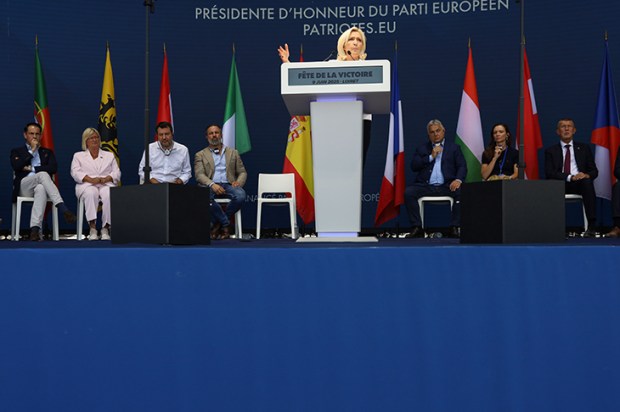Living in London for a few years in the late noughties, I opened a NatWest bank account. At the end of my time there I joined Tony Abbott’s office. The bank account was abruptly closed soon after, without explanation. Might this have been related to Abbott’s extreme political incorrectness from the perspective of the London blob? The possibility never occurred to me until Nigel Farage’s recent experiences with Coutts, one of the banks in the NatWest group.
Thank goodness the managers of Britain’s banks are dim as well as sinister. Any intelligent person knows that you don’t pick a fight with Farage, the country’s smartest politician. As a result of the managers’ ineptitude, we now know how deeply the left has captured the corporate world – on top of much of the education system, the public service, the media, entertainment, the armed forces, the Church of England and, since the accession of King Charles III, the monarchy.
The Sunak government has, probably reluctantly, sided with Farage against Coutts’ ‘debanking’ of him for his political views, so bringing down the career of NatWest’s chief executive, Dame Alison Rose, an establishment favourite knighted by the King and recently invited by him to discuss climate change issues with President Biden. Paid the absurd salary of £5.25 million last year, she demonstrated farcical incompetence, both breaching client confidentiality in gossiping to a BBC journalist about the closing of Farage’s account and claiming wrongly that this was not for political reasons but because his balance wasn’t high enough. Farage then easily obtained Coutts’ 40-page charge sheet against him. Charges included: his support for Donald Trump; sharing a ‘transphobic’ tweet by Ricky Gervais; suspected anti-vaxxing views; calling for a referendum on net zero; and the claim he is a racist – all, of course, inconsistent with the ‘inclusive values’ of Coutts, a bank available only to millionaires and long a favourite of famously inclusive Middle Eastern autocrats.
Rose claimed to be unaware of the dossier and apologised to Farage for its ‘deeply inappropriate’ content, claiming that ‘it is absolutely not our policy to exit a customer on the basis of legally held political and personal views’ – although that is precisely what happened. After the fiasco, NatWest’s board, amazingly, expressed continued confidence in her. An off-the-scale public backlash followed, after which the government, which owns 38.6 per cent of NatWest, having initially seemed relaxed about the board’s support for Rose, suddenly ordered her axing. Coutts’ Australian chief executive, Peter Flavel, soon followed. The bank has now done a U-turn, telling Farage he can have his accounts back.
The saga revealed that Britain’s deranged right-on banks aren’t confined to the NatWest group: a further ten refused Farage an account. And it emerged that account closures are a vast and growing phenomenon. In 2016 the number was under 50,000. Last year it was 343,500 and so far this year it’s 200,000. Accounts are almost always closed suddenly and without explanation, an act as devastating as having the electricity or water cut off. Many of the closures relate to fraud and money laundering and others are because customers are deemed ‘politically exposed persons’, based on the odd justification that people connected, even indirectly, with public office are somehow more susceptible to fraud. This has led to the ‘debanking’ of people of all political persuasions, even their relatives, and seemingly anyone with a Russian connection, even if anti-Putin. But the banks’ commitment to ‘progressive’ values means conservatives in particular have come under their spotlight. Columnist Simon Heffer was interrogated about his friendship with Farage before he could top up his pension fund; and NatWest abruptly closed the account of Professor Leslie Sawers, a staunch defender of women’s rights on transgender issues.
The government has said it will introduce new rules requiring banks, if they propose to close an account, to explain to customers why and to allow them an increased 90 days to challenge a decision. And Chancellor Jeremy Hunt has said banks cannot close accounts because of customers’ political beliefs. These steps, if followed through – never a given under the Tories – might make other corporate leaders hesitate before targeting customers for their politically incorrect views.
But the Farage-gate revelations suggest the wokery of Britain’s corporate institutions has gone too far to be easily reined back. What was once seen as core business now everywhere seems to be less important than leftist ideology. So we see, for example, Costa Coffee featuring in its advertising not messages about the quality of its coffee, but its commitment to transgender rights, via an image of a person bearing the scars of a double mastectomy. Just as the police seem to find plenty of time to participate in Pride parades – but not to respond to burglaries – Coutts managed to devote significant resources to compiling their Farage hatchet-job against a background of banks closing 5,000 branches since 2015 and making it ever more difficult for customers to speak to a staff member.
The saga also says much about what it takes these days to get to the top of the corporate ladder. Many of us might have assumed it had something to do with improving customer satisfaction and increasing profits. But it’s now clearer than ever that, certainly when it comes to Britain’s banks, it’s more important to signal commitment to the latest woke pieties. When Rose took over NatWest in 2019, she said ‘tackling climate change would be a central pillar’ of her leadership. Sure enough, she immediately ended new loans for North Sea oil and gas extraction, lessening Britain’s energy security and driving up energy prices. Under her tenure, NatWest’s share value dropped by 11 per cent.
The mostly woke Tories don’t want an extended battle with woke companies. But the trend to leftist capitalism would be worse under Labour. Opposition leader Sir Keir Starmer echoed the government in saying Rose had to resign. But his front-benchers liked the idea of companies blacklisting conservatives.
This raises the question of whether, in time, the corporate social justice warriors might extend ‘debanking’ to other undesirables, eg. beef and dairy farmers or consumers of ‘inappropriate’ or ‘problematic’ media or entertainment. Don’t be surprised if, under Britain’s next government, the drift towards woke corporate authoritarianism strengthens further.
Got something to add? Join the discussion and comment below.
@markhiggie1
You might disagree with half of it, but you’ll enjoy reading all of it. Try your first month for free, then just $2 a week for the remainder of your first year.













